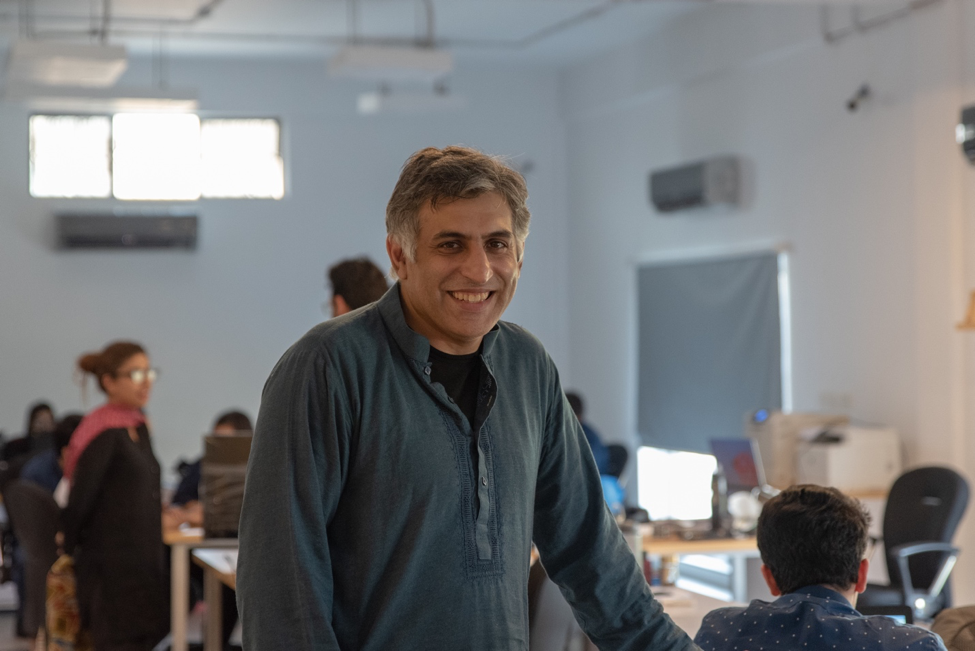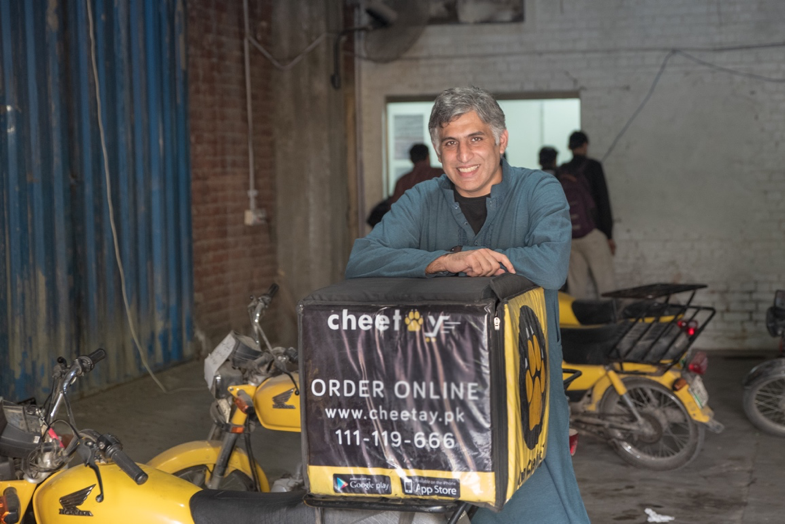I was running late and driving a little faster than usual. Ferozpur Road on a Friday evening is never easy on drivers as heavy traffic mounts up. Ten or so minutes off Ferozpur Road and obediently following Google Maps navigation through streets of Kot Lakhpat Industrial state, I was outside Cheetay.pk office.
As I entered the premises the first thing I noticed was a big lush lawn with football posts installed. Unlike small corporate offices in Gulberg or DHA, Cheetay.pk has made a much bigger estate for its home. I must confess, I had assumed Cheetay to be a small team and LinkedIn gave me similar numbers. Walking through the premises and noticing the number of cars and bikes parked I had realized my mistake of assuming only white-collar workers, who create their LinkedIn profiles, would be Cheetay’s workforce. Right behind the spacious lawn on ground floor, were two big warehouses where quite a few signature Cheetay bikes were parked. I also noticed ten or so Cheetay riders in their bright yellow uniforms. The size of the two warehouses and activities around them hinted of them being filled up when all Cheetay riders return back at night.
I made my way towards the first floor and I could see more workforce at Cheetay. Technology, Marketing and Sales talent housed on the first floor seemed quite busy in their routines. The office had a startup feel of casualness and simplicity. I waited in a small meeting room and was going through my questions when Ahmad entered the room and warmly greeted me. Meeting anyone for the first time is always interesting, it’s like a white canvas waiting to be filled with your observations.
Ahmad came off as a casual and friendly person, perhaps a leader of those traits as well. The first thing he asked took me off guard. “You have a DSLR, can we quickly use it for some work at the office?”, Ahmad asked while pointing to my camera. I could sense him as a man who gets things done whatever it takes. I lent him my camera and we sat down to start our conversation.
Me: You come from a successful business family. Why take the difficult road of startups and not just enjoy your wealth?
Ahmad: We were not a business family as such. My father was an engineer in the Middle East and he set up a factory in 1995 in Pakistan after retiring from his job. We did not grow up in an entrepreneurial household, rather it was very professional. We were always taught excellence is the only currency that is important. Actually, we were always a middle-class family in elite environments like Aitchison and LUMS. When I joined my father’s business our total export was PKR 20 million, that grew to PKR 500 million by the time I left to join Rocket Internet.
Me: That is a significant revenue figure, why leave a business with such high growth and prospects?
Ahmad: The idea was to create a bigger impact in society which legacy textile industry cannot do. You have to develop a whole new market for bigger impact. I had realized nothing much existed in e-commerce in Pakistan so I initiated Daraz.pk with Rocket Internet which kickstarted the e-commerce ecosystem. Founding a company that launched an ecosystem was an amazing experience that running a textile business could not have provided.

Me: You have worked with McKinsey & Co, so did founders of Careem. What is in McKinsey’s DNA that produces so many founders?
Ahmad: There are two big advantages of big-name companies like McKinsey. First, their brand name open doors for you which are not available to others. For instance, if I call someone and tell them I have a sock manufacturing business they will have many doubts about credibility. As compared to calling myself an ex-McKinsey employee which has a lot more global credibility. The second major advantage is the network effect. McKinsey alum have founded unicorn companies like Careem and many others are at top positions of financial institutions, which enables you to be part of a strong network.
McKinsey also teaches you hardcore problem solving, that is, how to properly structure and solve a problem. However, mostly its theoretical and people who leave McKinsey and found companies go practical with the learnings.
Me: You worked with Rocket Internet for a few years. What made you join them and how was the experience?
Ahmad: As I mentioned earlier, I was interested in building an e-commerce ecosystem in Pakistan. Learning how to build that on someone else’s money was an exciting proposition for me. They had high ambitions of doing something in Pakistan which was never done before. Besides that, they offered great perks and autonomy to operate. However, they could have shared Daraz.pk equity when it got sold but that never happened.
Me: Do you regret not being at Daraz.pk when AliBaba acquired it?
Ahmad: Not at all. I had a wonderful time there learned a lot but the end was not fun for me.
Me: Are you a solo founder or a co-founder?
Ahmad: Actually four of us thought of Cheetay, however, I was the only one on the ground and fully involved. The other three were abroad and spent 20-30% of their time. So, in a strict sense, I can be called a solo founder, but I have a lot of support from everyone.
Me: Cheetay markets itself as a logistics company. Why not stick to the food delivery market before making other delivery options available?
Ahmad: We are primarily a food delivery company. We want to dominate this market before doing anything else. However, we also want to experiment and see what is next. Food delivery has certain dynamics. Lunch and dinner have specific timings after which the delivery fleet is mostly idle. Lack of utilization hurts our business model so we experiment with opportunities beyond food delivery.
Me: How big is the Cheetay team and are you profitable?
Ahmad: We are close to 400 people now. We have two satellite offices as well including delivery fleet and operations. In terms of profitability, we are still burning money. Our unit economics are very encouraging but the overheads we have built for growth consumes cash. We can slow the growth and make profits right now but our goal is to be 50 times bigger to what we are right now.
Me: Who is your biggest competition?
Ahmad: FoodPanda is our biggest competitor. As a fulfillment company, TCS and similar companies are our competitors as well.
Me: The driver rating feature in Uber and Careem can be very helpful. Have you thought of building one for Cheetay riders?
Ahmad: All of our riders are salaried employees. Our claim is no matter which rider you get, you should have a standard experience. We train the rider, give them uniforms and smartphones so it does not matter to a customer who the rider is. Uber or Careem drivers are not salaried employees and rating makes sense in that model.
Me: Your Facebook page has 130K likes but the user rating is 2.9. Why is that?
Ahmad: It is unfortunate. We are an ops-based business and it is hard to satisfy customers in such a business. We have a 91% on-time delivery rate. With such a high delivery rate the 2.9 ratings do not make sense to me. One thing we have noticed that most people giving ratings on Facebook are dissatisfied customers as compared to satisfied customers who don’t often rate us. I also think we have the best service available in the market.
Me: You talk a lot about analytics. How do you make use of them?
Ahmad: We are very technology focused. All our riders have a smart phone. We provide tablets to restaurants. It is all connected and we collect all analytics. I can tell you average food prep time of every restaurant. We often see ourselves as a tech company who has a lot of data in this domain. Also our app is actually a platform. Currently a restaurant has multiple tabs from service providers. We actually want more service providers to use our platform and reduce the tabs on restaurant desk.
Me: Can you tell us about Jabberwock Ventures?
Ahmad: After working with Daraz and Kaymu we saw some gaps in the market. One was fulfillment and other was payments. We setup Jabberwock Ventures to solve these problems with a focus on Pakistan. Cheetay is our answer to fulfillment. In future we want to get into payments and other opportunities in Pakistan like content streaming. Jabberwock is supposed to be our vehicle to fund these ideas.
Me: Is the Jabberwock fund actively investing?
Ahmad: We have a very active board that is investing as well. We have invested close to USD 4 Million in Cheetay and raising more funds as well.
Me: Is Pakistani close to having a tech unicorn?
Ahmad: We know EasyPaisa numbers, $180 million for 51% shares imputing a total value of $360 million. While we are getting closer but not enough at the moment. We have prospects though, Zameen.com, PakWheels, Daraz, etc.
Me: What do the next three years for Cheetay look like?
Ahmad: We want to scale to 12-13 major cities. We want to dominate the last mile delivery space and reach to any city we can.
We concluded our conversation and head out to locate my DSLR, that I am sure was playing a crucial role in Cheetay’s success. As I started the walk to my car along the green football field I could not help appreciate Ahmad and Cheetay’s achievements so far. Cheetay who had a very small fleet just a couple of years ago now is a front runner company and a team of a few hundreds. There is no other way for a Careem or Grab to originate from Pakistan unless entrepreneurs like Ahmad take the intermediate steps of creating the market and platform to enable and inspire the next wave of founders.





 Wait not again? Facebook admits it collected 1.5 million users’ contacts without consent
Wait not again? Facebook admits it collected 1.5 million users’ contacts without consent
Comments are closed.